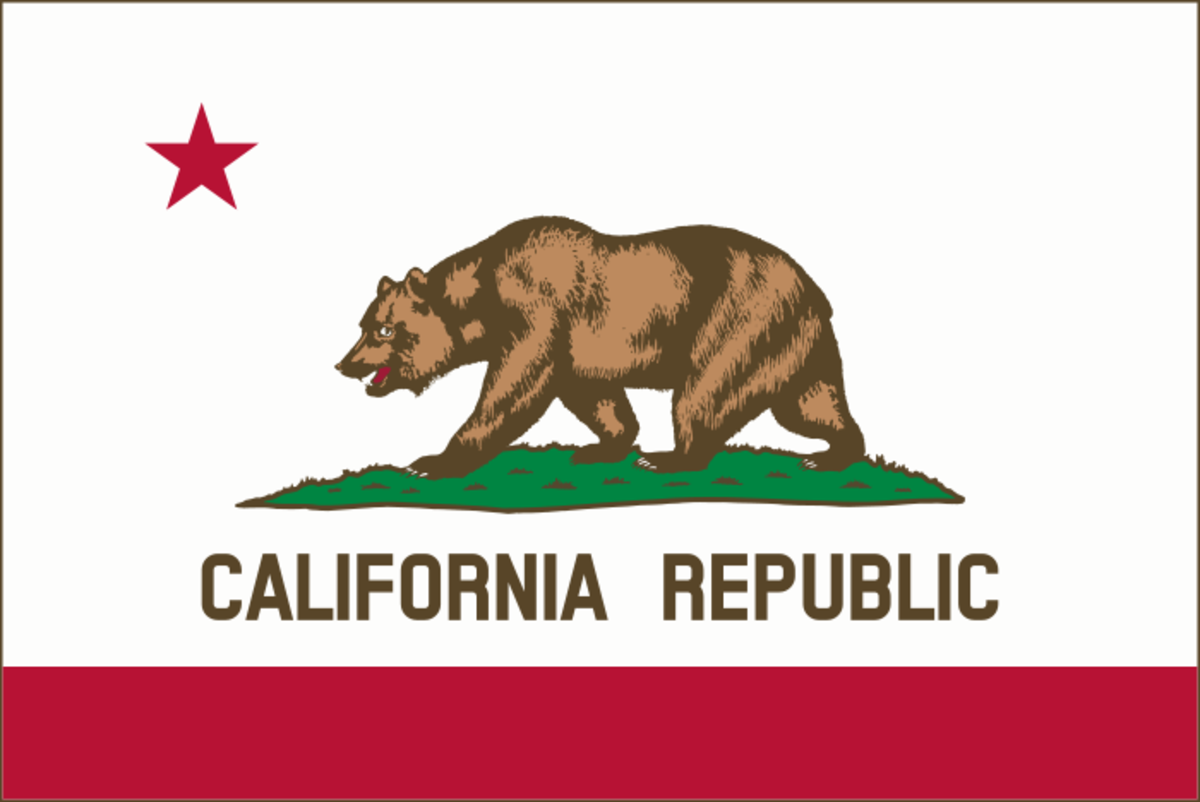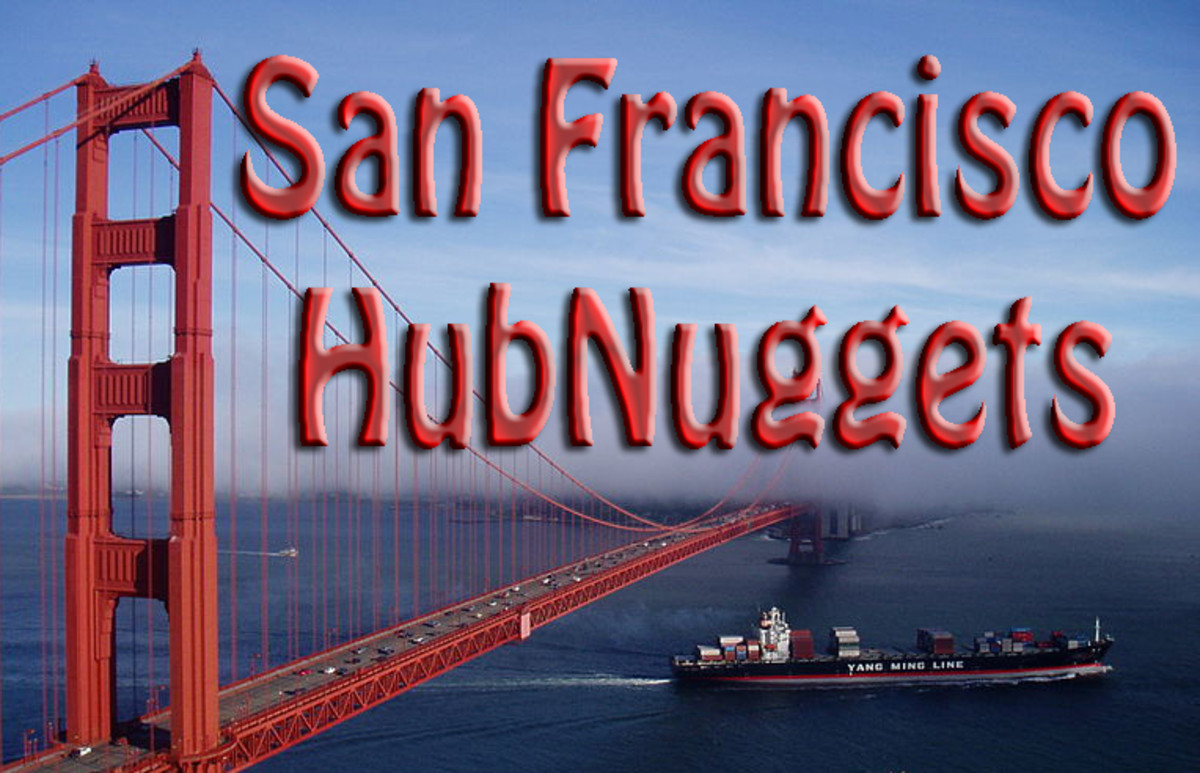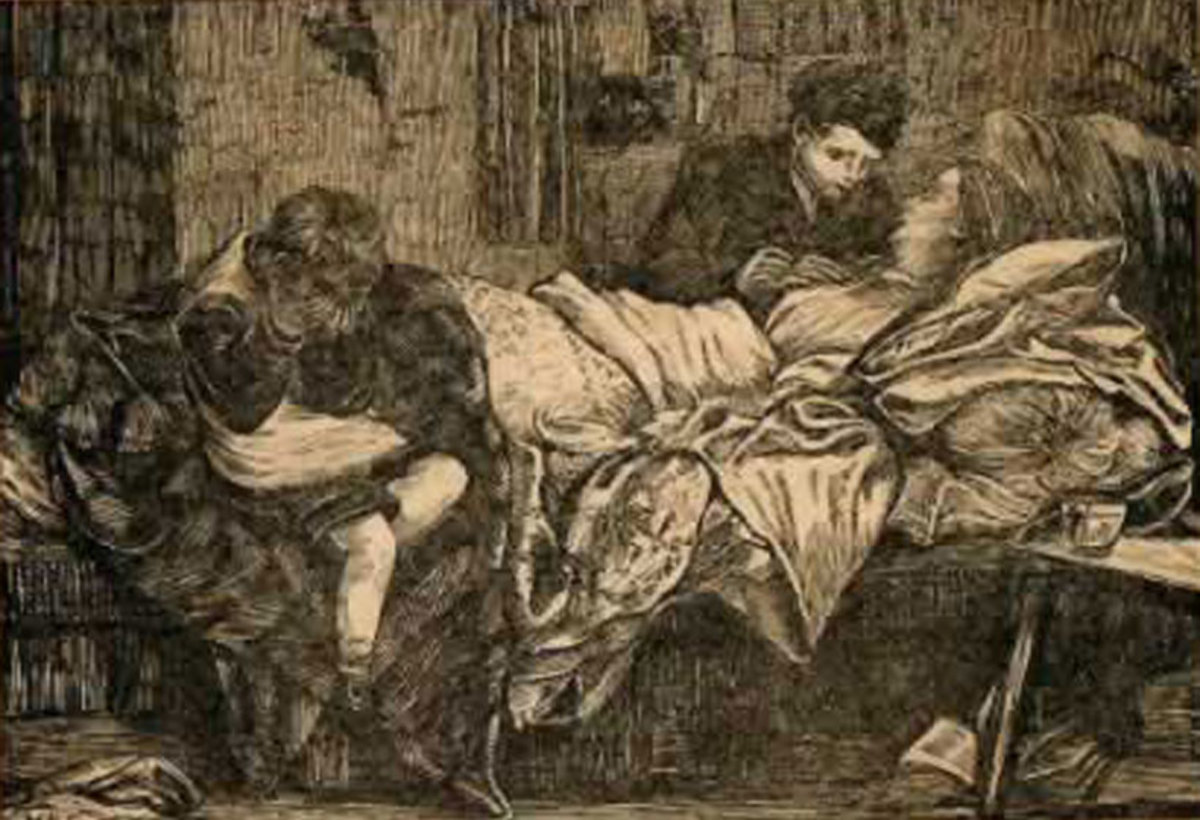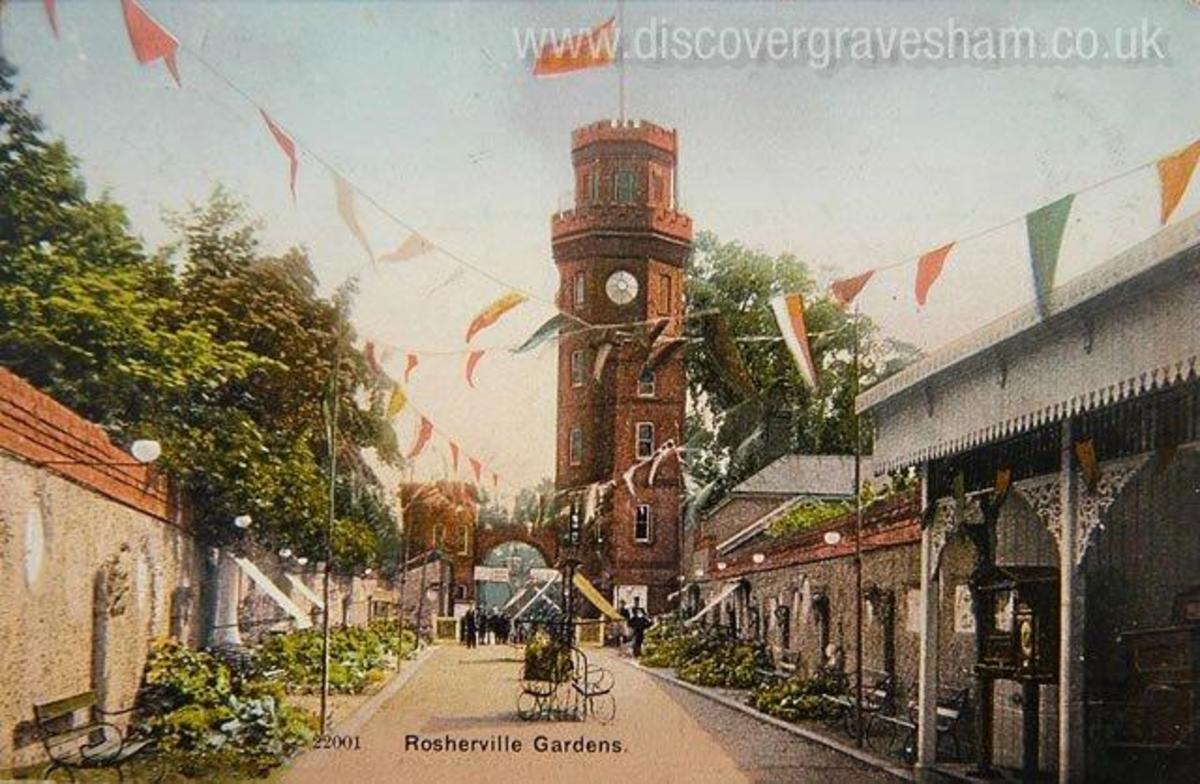- HubPages»
- Education and Science»
- History & Archaeology»
- History of the Modern Era
The Emperor of San Francisco
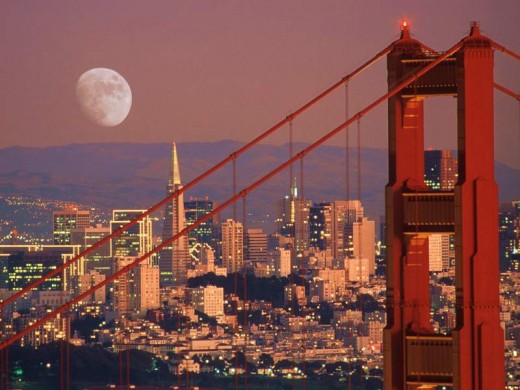
In 1859, the growing metropolis of San Francisco, California became the capital of a new empire that changed the governmental and political structure of the United States. No longer would there be a democracy. No longer would there be the founding fathers. No longer would there be a Constitution. There would only be the wisdom of one person. There would only be the emperor.
At least that was the world inside the head of Joshua Abraham Norton who proclaimed himself His Imperial Majesty Emperor Norton I, the Emperor of the United States and Protector of Mexico. Norton was a man who lived in San Francisco and acted and lived as if his delusions were actually true. And the citizens of his Kingdom played along.
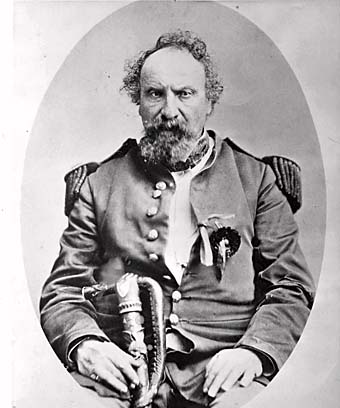
Early Life
Norton was born in 1819 in London but spent most of his youth in South Africa when his parents moved there when he was two years old. In 1849 Norton moved to San Francisco with the money he received from his father's estate. Initially Norton had some success in Real Estate Endeavors. However, Norton then invested money in Peruvian Rice which after a few years went bankrupt. After losing a lawsuit trying to void the deal he entered Norton lost everything. He left San Francisco in what he called a self imposed exile but returned a few years later.
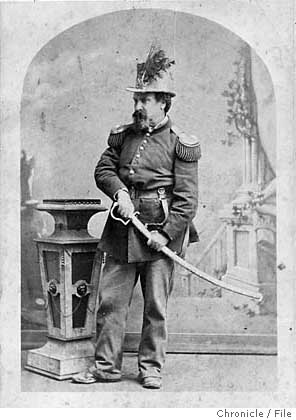
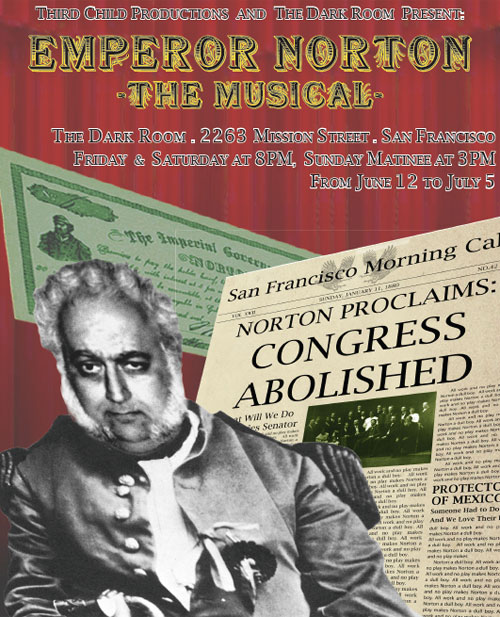
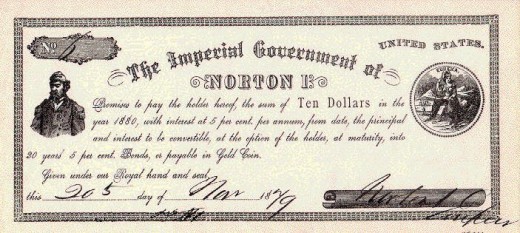
Long Live the Emperor
Upon Norton’s return to San Francisco it was apparent that he was mentally unbalanced. Norton was also disgruntled with what he called the inadequacies of the legal and political structures of the United States. Despite having no political power or political ties, no standing army, or any followers, on September 17, 1859 Norton distributed letters to the newspapers of San Francisco declaring that he was now Emperor.
Norton’s proclamation was published, as a joke, in many San Francisco newspapers. The proclamation stated, ““ At the peremptory request and desire of a large majority of the citizens of these United States, I, Joshua Norton, formerly of Algoa Bay, Cape of Good Hope, and now for the last 9 years and 10 months past of S. F., Cal., declare and proclaim myself Emperor of these U. S.; and in virtue of the authority thereby in me vested, do hereby order and direct the representatives of the different States of the Union to assemble in Musical Hall, of this city, on the 1st day of Feb. next, then and there to make such alterations in the existing laws of the Union as may ameliorate the evils under which the country is laboring, and thereby cause confidence to exist, both at home and abroad, in our stability and integrity.”
As Emperor, he also issued many decrees including calling for a tunnel and bridge to be erected across San Francisco Bay. Norton was also upset at what he perceived as corruption and ordered that Congress be immediately abolished. Seeing that people were divided within the Country, in 1862 Norton abolished the Republican and Democratic parties.
Norton, as Emperor, was a well known figure around San Francisco. Norton was often seen walking the streets of San Francisco wearing his blue uniform that was given to him by army officers at the Presidio. Norton also wore a beaver hat that was decorated with a peacock feather. Norton would inspect sidewalks and cable cars and the appearance of police officers. Everything in his Kingdom had to live up to the high standards he set.
The citizens of San Francisco played along. When the Emperor issued his own currency, the businesses he frequented accepted the currency as if it were real. And these businesses included some of the finest restaurants found in the area. No theater dared open a show without reserving a seat for the emperor.
The citizens of San Francisco also cared for their emperor. The emperor’s palace was a small boarding house room paid for by tax dollars. When his uniform became shabby, the City Supervisors provided him with a new one for which they received his thanks and were given a patent of nobility. When Norton was arrested in 1867 to commit him to a mental institution, the people of San Francisco were outraged and newspapers ran editorials against his institutionalization. Embarrassed by the mistake, the Police Chief ordered that Norton be released and issued a public apology. Whenever the Emperor walked past police officers they saluted him for the rest of his life.
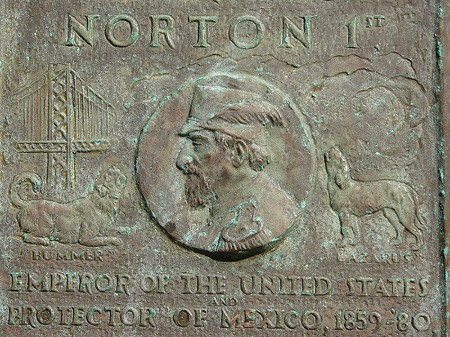
The Emperor’s Legacy
As much as the people of San Francisco gave to their Emperor it was not without due consideration. During the 1860s and 1870s there were numerous anti-Chinese rallies around San Francisco. Many of these rallies turned into riots. During one of the Emperor’s inspections of public property he came across a rally and saw that many of the Chinese were being threatened by the rioters. The Emperor put himself in between the two groups and began reciting the Lord’s Prayer over and over again. Feeling shamed by the Emperor’s act of kindness, the rioters left and no one was hurt.
On January 8, 1880 Norton died after collapsing on a street corner. Newspapers ran editorials remembering the Emperor. A few days later an estimated 30,000 citizens of San Francisco lined the streets to pay homage to the Emperor. The City paid for his funeral procession and final resting place. His grave reads: Norton I, Emperor of the United States and Protector of Mexico.
And the Emperor has been remembered since. The Emperor serves as the foundation for Mark Twain’s character King in Huckleberry Finn. In 2004, a resolution was being floated to rename the San Francisco – Oakland Bay Bridge, the bridge he decreed, after him. The Resolution failed. But the Emperor will always be remembered.
Related Articles
- Benedict Arnold: From Founding Hero To Traitor
The name Benedict Arnold in American lore is synonymous with being a traitor to the United States. And with good reason. Benedict Arnold for his own personal reasons and benefit committed crimes against the... - John Lothropp: The American Father
Throughout European History, Genealogy played an important role in shaping the Europe we know today. The Kings of England, Germany and Russian were related by marriage and blood. Wealth and power were passed... - Santa Barbara: The First Hollywood
The name Hollywood is known the world over. The name signifies the movie industry and represents the dreams and hopes of thousands of aspiring actors. However, many do not know that the Hollywood of...





